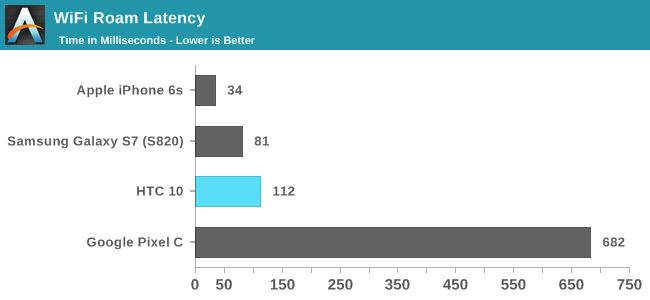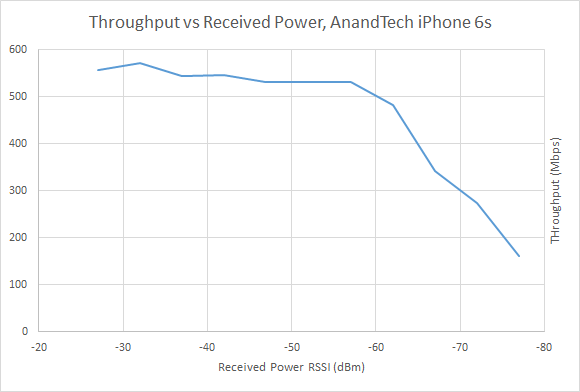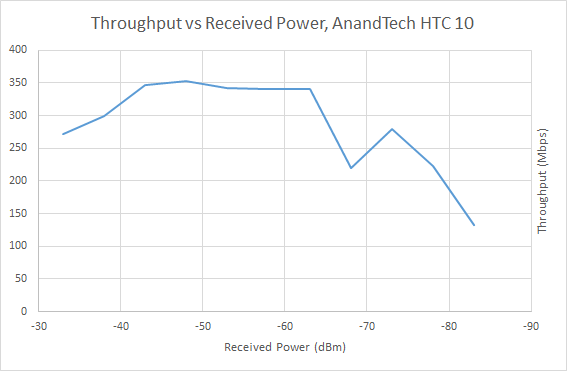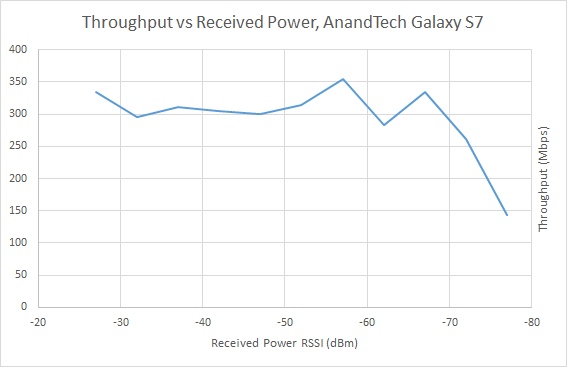The HTC 10 Review
by Joshua Ho on September 19, 2016 8:00 AM ESTWiFi Performance with Ixia IoT
As previously discussed, RF testing has always been a major unknown to some extent because environmental factors make it extremely difficult to tell exactly what is going on with the system. I don’t think it really needs to be said but previous reviews and any controversy regarding the quality of RF has always lead to a ring of confusion and back and forth with no clear-cut answers, at least in the public domain. The Transformer Prime and Pixel C reception issues have all been cases where I’ve seen a lot of confusion over whether a problem really existed in the hardware, software, or with the end user.
Most people really don’t have any understanding of how wireless transmission works, probably because it’s not really something you can see. As far as I know, no one is capable of seeing radio waves, even at high frequencies like 60 GHz. Of course, the problem is that for quite some time our testing was also not really ideal for seeing the quality of an RF implementation. While iPerf does provide some useful data, free space testing means that we’re dealing with channel conditions that inherently cannot be controlled. As a result, the only sensible test we could do with iPerf was focus on maximum throughput in the best conditions we could provide. The only thing that this can highlight is the upper bound of efficiency for WiFi due to the carrier sense multiple access scheme in most cases, and rarely detects a whole class of problems that affect user experience on WiFi.
In order to test these things we’ve moved to using a proper testing system that is actually used by at least a few OEMs today, namely Ixia IoT. While we discussed the possibilities for testing, at this time due to the RF isolation chamber used we are limited to AP simulation only, so we can’t properly simulate clients in the channel without restricting ourselves to a single spatial stream for both the AP and client. This wouldn’t be a very useful test if set up in this manner as most devices today that we’re testing have support for two spatial streams, and many routers have three or even four spatial streams at this point.
The first set of results we can talk about that will be of interest is rate vs range. This is a fairly simple test at a conceptual level, as it simply tries to see how well a device can maintain its performance in the face of reducing signal to noise ratio for a given modulation and coding scheme. This is a good high level test of how well a device can maintain a connection as reception degrades. In this test the HTC 10 had an initial RSSI of -28 dBm while the GS7 was at -21 dBm and the iPhone 6s at -22 dBm, which allows us to calculate the path loss and determine the RSSI as a function of the transmit power.
The results of this test are interesting to say the least. Off the bat, every device had different RSSIs measured, so this meant that everything had different levels of path loss. The HTC 10 seemed to have the most path loss, while the Galaxy S7 and iPhone 6s were functionally identical. However it looks like RSSI is really an insufficient metric here because while the iPhone 6s was able to reach maximum throughput using NSS 2 MCS 8, the HTC 10 and Galaxy S7 did its best at NSS 2 MCS 4 or 5. I suspect this may be just due to placement as device positioning strongly affects MIMO as receive-side spatial correlation reduces the gains that MIMO can provide. Regardless, the HTC 10 somehow manages to beat the Galaxy S7 through much of the curve, but for some reason suffers from a reduction in throughput at higher transmit power. It's worth mentioning though that this test doesn't allow for testing of antenna gain or similar tests. Given various levels of futzing about with the device positioning in the test chamber I'm fairly confident that the Galaxy S7 is consistently better with regard to path loss, so even if it doesn't perform as well at a given RSSI it tends to have a higher RSSI than the HTC 10 by about 5 dBm which is fairly significant. I'm hoping to get some true antenna efficiency measurements with 3D plots in the near future so we can really give some real data on everything relevant here but for now this test highlights fairly well how WiFi performance varies.
Finally, the other test that we can run at this time is the roaming latency test, which tests how well a device can hop from one access point to another as the received transmit power rises and falls. If you ever rely on WiFi to work as you walk around any building larger than a single apartment unit, you’re going to feel the effects of high roaming latency as VOIP calls or any real-time network application will either experience interruption or drop altogether if roaming is not implemented properly.

Like the Galaxy S7, the HTC 10 really struggles with WiFi roaming as it seems almost universal that Android OEMs aren't really paying attention to anything that we don't test. The HTC 10 tended to not fail handover as often as the Galaxy S7 with only one failure out of 64 trials and fairly consistent latency around 110ms though. This is a bit of a surprise considering that the HTC 10 is generally considered in the broader discourse to have worse WiFi across the board compared to the Galaxy S7. Considering how much smaller HTC is this is really kind of strange to see. Just about anything will outperform the Pixel C though. Either way, HTC still should improve here, especially when considering how most schools and offices need good WiFi to make up for areas with cellular coverage gaps.













183 Comments
View All Comments
edlee - Wednesday, September 21, 2016 - link
i loved my m8, nothing i got recently feels as good as that phone did.Since that phone, i have had s6, and s7 edge, but for some reason m8 will always stick with me
bennyadamo - Thursday, October 6, 2016 - link
Agreed. The One M8 was a smartphone masterpiece. I owned both the M8 and a Galaxy S5 (and numerous iphones) and in terms of design, performance and user interface you still can't beat the M8. And HTC's Sense UI absolutely blows iOS and "Touchwiz" out of the water (just an aside, but how idiotic is "touchwiz" as a name for a UI? Or for anything else for that matter? I feel embarrassed just typing it). If you think the UI doesn't make a huge difference in your phone experience, try using Sense and Touchwiz side-by-side for a week. Even just small things like the small amount of lag time it takes for the display to re-orient from portrait to landscape when rotating the phone in your hand become infuriating when you have to live with Touchwiz daily. And besides the superior UI, the One M8 just looked and felt like a premium piece of hardware. Many, many times I had people ask me what type of phone it was or inspect it front to back when I let them hold it in their hands, impressed by the solid/premium feel of it. At this point, the One M8 is still (rather unfortunately) HTC's high-water mark. Although having said that I did just order the HTC 10 to take advantage of their sale ($150 off if you buy an unlocked phone directly from HTC from 10/1/16 to 10/8/16).Also, I read some of these comments saying that it's a waste of time to review or buy a phone 7 months after it's launch - that's not true and is a really misguided/misinformed opinion. A lot of people buy a phone that long after it's come out simply because they are waiting for their current phone contract to expire. Other reasons are because some of the teething bugs have been worked out or simply because the price drops after that amount of time (read above re: HTC's current sale on the HTC 10). The average person doesn't need to buy the newest/highest-end/highest-spec phone every year, and most people probably get 2-2.5 years out of a smartphone like this.
ipaulw83 - Monday, September 19, 2016 - link
certainly not dead, the HTC 10 is a far much better choice than the G5, S7 & Note 7 "Fiasco" and other flagships. the only real threat to HTC is the OnePlus 3 but overall the build quality and camera is in favor of HTC 10... i would hate to see them die or break software updates promises as recent news, nevertheless they have a great product that is more special than any other current android flagship (IMHO).i do not own any HTC product currently or stock or anything i use an iphone and an LG nexus 5x but wanted to give my opinion
repatch - Monday, September 19, 2016 - link
"far much better choice" for you perhaps. Why all the generalizing?I for one went with the LG G5, for one reason: the camera. The super wide angle camera on this thing is FANTASTIC, everyone who's seen it marvels at the kind of shots you get with it. It's REALLY fun. For ME, the "far much better choice" is the G5, but that won't apply to most others.
The S7 for me was a no go due to the glass back (can't stand glass backs because they are so prone to breakage, my Nexus 4 went through 3, and NONE of those were broken due to drops). The HTC 10 just didn't have anything 'special' going for it.
Again, that's MY opinion, it's best to sit down and write down what are go/no go's, for YOU, and make a choice that way.
IMHO of course.
Impulses - Thursday, September 22, 2016 - link
I really wanted to like LG's latest, I use an ultra wide lens on my mirrorless M4/3 cameras so that was right up my alley... The overall package (and uber gimmicky modules on their latest) never convinced me.If I HAD picked up a new phone last year it would've been a 10, for the better audio and lack of TouchWiz... My N5 is still trucking along tho, at least until the Pixels come out.
This breadth of choices, even in a market that's contacting, is still something I really like about the Android ecosystem.
FourEyedGeek - Monday, September 19, 2016 - link
Already have the Galaxy S7...smorebuds - Monday, September 19, 2016 - link
And this article is for you and only you...FourEyedGeek - Tuesday, September 20, 2016 - link
Its for all those people who want to make a decision on buying a new smartphone, but might have been helpful to those making a choice months ago don't you think?Freido - Monday, September 19, 2016 - link
HTC 10 is a nice looking phone. But it lacks a high brightness screen. It is a tad bigger as well. Thats my personal opinion. If it was a bit smaller like 4.9", I would have bought it. I've decided to buy Sony X compact or iPhone SE. Recent Sony phones like xlX performance and XZ sports very good displays I think. Looks as stunning as of iphones IPS displays.I was wondering why Anandtech never reviews Sony flagships even though they does release good phones with less gimmicks.
Will anyone consider my suggestion?
fanofanand - Monday, September 19, 2016 - link
They have addressed this in the past, typically Sony does not give out samples to the press. In today's "give me everything for free" world, websites like this simply don't have the excess cash to go buying every cool new toy that comes out. Would it be sweet? Absolutely, but for the most part if Anandtech doesn't review something it's because they couldn't obtain one from the company.